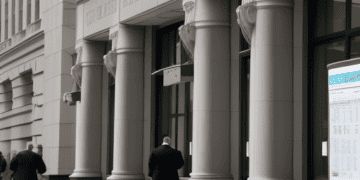In the first quarter of the year, three major United States financial institutions experienced a decline in deposits, showcasing the sector’s most significant crisis in over a decade. The reduction in funds is attributed to customers seeking better returns elsewhere amid ongoing industry challenges.
State Street Corp, a custodian bank, saw a 3% decrease in deposits, mirroring the trend at regional bank M&T Bank Corp. Charles Schwab Corp, a brokerage and financial advisory firm, faced a more substantial drop of 11% in deposits compared to the previous quarter.
State Street’s stock recorded an 11% decline, impacting peers such as Northern Trust Corp and Bank of New York Mellon Corp. Meanwhile, Schwab’s shares showed a 2.8% increase in afternoon trading, and M&T Bank shares rose by 7%.
This development sets the stage for a week during which several US regional lenders are expected to report earnings, shedding light on the aftermath of the recent collapses of two banks in the country.
Investors are closely monitoring executive commentary for insights into the economic impact of the Federal Reserve’s quantitative tightening. While this policy has bolstered income earned through lending, it has simultaneously introduced an element of uncertainty.
Schwab and M&T Bank managed to surpass profit expectations, leveraging a surge in interest income. However, State Street fell short due to a client fund outflow that adversely impacted its fees.
Analyst Susan Katzke from Credit Suisse noted that State Street’s earnings lagged estimates primarily due to lower-than-expected net interest income. The firm experienced more significant outflows from non-interest-bearing accounts.
Federal Reserve data released recently indicated an overall increase in deposits at all US commercial banks to $17.43 trillion in the week ending April 5. This rise was distributed relatively evenly among the largest 25 banks and small to mid-sized banks.
Although deposits at the largest banks surpassed pre-collapse levels of Silicon Valley Bank and Signature Bank, smaller banks are yet to reach their previous deposit levels.
Addressing concerns about its financial strength, Schwab, which was impacted by a crisis last month, paused stock buybacks. CEO Walter Bettinger emphasized that the speculation about forced selling of securities with temporary paper losses should be put to rest.
Fitch Senior Director Bain Rumohr acknowledged potential pressure on Schwab’s net revenue throughout 2023 due to higher-cost funding sources affecting net interest income. However, he expressed confidence that the firm’s size and scale should maintain profit margins consistent with historical levels.
Discover supply chain news insights on The Supply Chain Report. Enhance your international trade knowledge at ADAMftd.com with free tools.
#FinancialSectorCrisis #USBankDeposits #StateStreet #CharlesSchwab #MTBank #NorthernTrust #BankOfNewYorkMellon #FederalReserve #QuantitativeTightening #BankingTrends #FinancialInstitutions #InterestIncome #NetInterestIncome #USBankEarnings #DepositTrends #BankingIndustryAnalysis

















